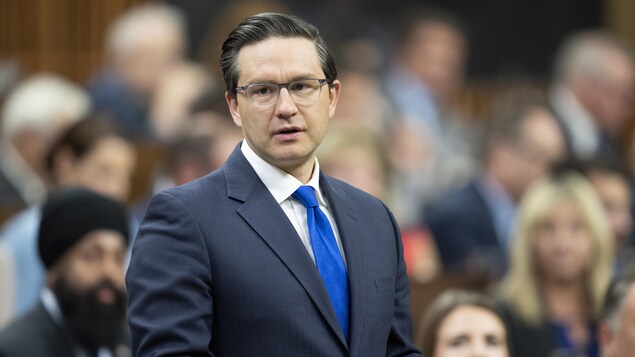Canada opposition leader says will restore ‘professional relationship’ with India

Canada opposition leader says will restore ‘professional relationship’ with India
The statement from Pierre Poilievre, the leader of the Conservative Party in Canada, highlights his commitment to restoring a positive and professional relationship with India should he become the next Prime Minister. His assurance to the Indian community in Canada reflects an acknowledgment of the importance of fostering strong diplomatic ties and promoting a mutually beneficial partnership between the two nations.
Furthermore, Poilievre’s condemnation of the aggression displayed towards Indian diplomats stationed in Canada and his denouncement of the growing Hinduphobia in the country underscore his stance against any form of discrimination or hostility. This position signals a commitment to promoting inclusivity and fostering a welcoming environment for all communities within Canada.
By addressing these issues and expressing his commitment to nurturing a positive relationship with India, Poilievre aims to emphasize the significance of maintaining cordial diplomatic relations and fostering a climate of respect and cooperation between Canada and India. His statements may serve to reassure the Indian community in Canada and contribute to building trust and understanding between the two countries, thereby fostering a conducive environment for collaboration and mutual growth.
The statements made by Pierre Poilievre in the interview with the Nepalese media outlet Namaste Radio Toronto reflect his commitment to fostering a professional and respectful relationship with the Indian government, highlighting the importance of maintaining diplomatic decorum even in the face of disagreements. Poilievre emphasizes the significance of recognizing India as the largest democracy on Earth, underscoring the need for constructive engagement and dialogue between Canada and India.
Regarding the removal of 41 Canadian diplomats from India, Poilievre’s remarks suggest a critical stance on the performance of Justin Trudeau’s administration. He portrays the incident as an outcome of Trudeau’s ineffective leadership and mismanagement of international relations, which, in his view, has led to strained relations with several major global powers, including India. Poilievre’s criticism underscores his belief that Trudeau’s leadership has resulted in significant diplomatic challenges, ultimately affecting Canada’s standing on the international stage.
Furthermore, Poilievre’s condemnation of the pro-Khalistan car rallies held in Ottawa, Toronto, and Vancouver, as well as the desecration of the Vaishno Devi Hindu temple in Abbotsford, British Columbia, reflects his strong opposition to any form of extremism and violence. His stance underscores the importance of safeguarding communal harmony and promoting a culture of tolerance and respect within Canadian society.
Overall, Poilievre’s statements signify his commitment to strengthening Canada’s diplomatic relations with India, promoting unity within Canada, and safeguarding the values of mutual respect, inclusivity, and peace. His remarks may resonate with those seeking a diplomatic approach that prioritizes constructive dialogue, mutual understanding, and the preservation of social harmony within the country.
Pierre Poilievre’s comments reflect a strong alignment with the values and principles of the Hindu community, emphasizing the importance of faith, family, and freedom. His condemnation of the attacks on Hindu temples and leaders, along with his stance against the aggression displayed towards Indian diplomats, demonstrates his commitment to protecting religious freedom and promoting a culture of respect and tolerance within Canadian society.
By addressing the issue of Hinduphobia and advocating for criminal charges against those who engage in attacks on Hindu temples and individuals, Poilievre underscores his dedication to upholding the rights and security of all religious communities in Canada. His stance not only highlights his commitment to combating discrimination and hate-based violence but also emphasizes his support for enforcing legal measures to protect religious institutions and their practitioners.
The indication that Poilievre’s Conservative Party is currently leading the incumbent Liberal Party by a substantial margin, positioning him as a favored candidate for the next Canadian Prime Minister, suggests a growing support for his policies and vision for the country. If elected, his commitment to protecting religious freedoms and promoting social harmony may pave the way for initiatives aimed at fostering an inclusive and respectful environment for all communities in Canada.
Overall, Poilievre’s strong condemnation of attacks on Hindu temples and leaders, along with his pledge to combat Hinduphobia and safeguard religious freedoms, aligns with his broader vision of promoting a more inclusive and secure Canada, emphasizing the importance of unity, respect, and the protection of fundamental rights for all Canadians.




